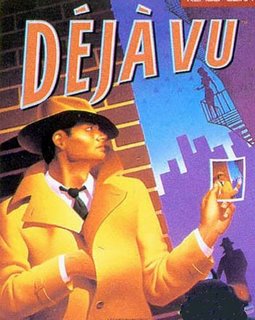 The Pensacola News Journal editorial staff pens a succinct, skeptical editorial today about George W. Bush's deja vu moment appointing Gen. Michael Hayden as the replacement for CIA director Porter Goss:
The Pensacola News Journal editorial staff pens a succinct, skeptical editorial today about George W. Bush's deja vu moment appointing Gen. Michael Hayden as the replacement for CIA director Porter Goss:In August 2004, Bush nominated Goss by saying, "He is the right man to lead this important agency at this critical moment in our nation's history."The credit for spotting this telling repetition, as many now know, actually belongs not to some courageous White House reporter who suddenly woke up, but to comedian Jon Stewart. Stewart's "Daily Show" news spoof on the Comedy Channel spotted Bush's deja vu moment three days ago, as Crooks and Liars documented.
Last week, he nominated Gen. Michael Hayden with these words: "He's the right man to lead the CIA at this critical moment in our history."
However that may be, the PNJ sees the Porter/Hayden nomination announcement as further evidence of the Bush administration's incompetence, "confusion and inertia" in managing the CIA. In truth, there are substantial grounds for concern that it masks an even deeper and more troubling feature to the administration's handling of the CIA agency.
As Sidney Blumenthal explains today in Salon.com [subscription or one-day free registration required] for five years Bush has been "looking for someone to rid him of the troublesome agency" ever since "CIA analysts...refused to put their stamp of approval on the administration's reasons for the Iraq war."
"Vice President Dick Cheney and his chief of staff, I. Lewis 'Scooter' Libby, personally came to Langley to intimidate analysts on several occasions. Secretary of Defense Donald Rumsfeld and his then deputy secretary, Paul Wolfowitz, constructed their own intelligence bureau, called the Office of Special Plans, to sidestep the CIA and shunt disinformation corroborating the administration's arguments directly to the White House.In other words, Mr. Bush appointed Porter Goss for political reasons, to purge the agency of analysts who would not gin up phony reasons justifying the administration's argument "that Saddam was cooperating with al Qaeda." In Goss and the retinue of Republican congressional aides he brought with him to the CIA, Bush thought "he had discovered the perfect man for the bloody job." He embedded a politician in the agency whose top priority was loyalty to George W. Bush, not the facts as revealed by professional intelligence workers.
"'The administration used intelligence not to inform decision-making, but to justify a decision already made,' Paul Pillar, then the chief Middle East analyst for the CIA, writes in the March-April issue of Foreign Affairs. 'The process did not involve intelligence work designed to find dangers not yet discovered or to inform decisions not yet made. Instead, it involved research to find evidence in support of a specific line of argument -- that Saddam was cooperating with al Qaeda -- which in turn was being used to justify a specific policy decision.'
Goss failed only because of Hookergate. His --
"attempt to run the CIA through his own band of loyalists proved his ultimate undoing. It turned out that the 'gosslings,' as they were known at Langley (after 'quislings'), had unsavory connections that trailed them into the agency. An unintended consequence of Goss' dependence on his team of political hatchet men was that his future was dependent on their past."And that is the really worrisome aspect to Bush's deja vu moment. It's not a question of "confusion" or "inertia." Bush is changing CIA directors, not his long-standing goal of politicizing the agency. Why shouldn't he recycle the same CIA director announcement? Nothing has changed but the name of the nominee.
As Blumenthal says, Hayden is just another "loyalist to the administration" who has used "his uniform as a shield against the heat generated by the revelation of illegal domestic surveillance by the NSA."
"Regardless of anodyne assurances offered in his forthcoming congressional testimony, Hayden will preside over the liquidation of the CIA as it has been known. The George H.W. Bush CIA headquarters building in Langley will of course remain standing. But the agency will be chipped apart, some of its key parts absorbed by other agencies, with the Pentagon emerging as the ultimate winner.Concludes Blumenthal, "No president has ever before ruined an agency at the heart of national security out of pique and vengeance. The manipulation of intelligence by political leadership demands ever tightened control. But political purges provide only temporary relief from the widening crisis of policy failure."
"The militarization of intelligence under Bush is likely to guarantee military solutions above other options. Uniformed officers trained to identity military threats and trends will take over economic and political intelligence for which they are untrained and often incapable, and their priorities will skew analysis. But the bias toward the military option will be one that the military in the end will dislike. It will find itself increasingly bearing the brunt of foreign policy and stretched beyond endurance. The vicious cycle leads to a downward spiral. And Hayden's story will be like a dull shadow of Powell's -- a tale of a 'good soldier' who salutes, gets promoted, is used and abused, and is finally discarded."






2 comments:
I didn't know that the CIA was a separate branch of government responsible only to the press.
The way it works is the C.I.A. is responsible to congress. The president appoints the C.I.A. director conditioned on congress approving. Both the president and the congress are responsible to the people. The press informs the people when congress or the president falls down on the job. When the press falls down on the job we are all screwed.
Post a Comment